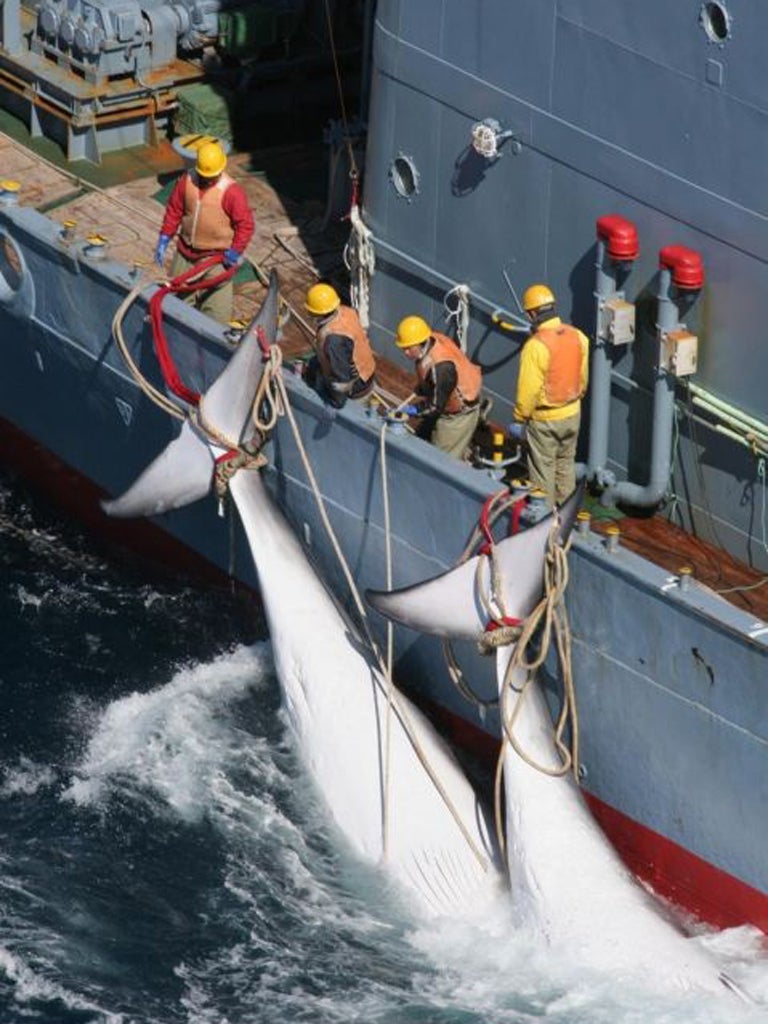Japan uses tsunami victims' cash to shield whalers from activists
£19m from fund set up to rebuild coast stricken by triple disaster is diverted to help fishing fleet

Your support helps us to tell the story
From reproductive rights to climate change to Big Tech, The Independent is on the ground when the story is developing. Whether it's investigating the financials of Elon Musk's pro-Trump PAC or producing our latest documentary, 'The A Word', which shines a light on the American women fighting for reproductive rights, we know how important it is to parse out the facts from the messaging.
At such a critical moment in US history, we need reporters on the ground. Your donation allows us to keep sending journalists to speak to both sides of the story.
The Independent is trusted by Americans across the entire political spectrum. And unlike many other quality news outlets, we choose not to lock Americans out of our reporting and analysis with paywalls. We believe quality journalism should be available to everyone, paid for by those who can afford it.
Your support makes all the difference.Japan caused outrage yesterday as authorities confirmed it is diverting millions of pounds tagged for the reconstruction of its tsunami-devastated coast to protect its annual Antarctic whale-hunt.
Roughly 2.28bn yen (£19m) from a reconstruction fund for areas badly hit by the crippling 11 March earthquake, tsunami and ensuing nuclear disaster will be used to beef up security for the Japanese whaling fleet, which left port under heavy guard this week.
The money is part of about 500bn yen in "fisheries-related spending" green-lighted by parliament last month. Japan's Fisheries Agency justified the decision by saying that "safer hunts" would ultimately help whaling towns along the coast to recover.
"Many people in [those areas] are waiting for Japan's commercial whaling operations to resume," said the agency's spokesman Tatsuya Nakaoku. The agency said that some of the money is earmarked to allow the fleet to "stably carry out its whaling research".
Conservationists immediately condemned the plan. "Not only is the whaling industry unable to survive without large increases in government handouts, now it's siphoning money away from the victims of the 11 March triple disaster, at a time when they need it most," said Junichi Sato, executive director of Greenpeace Japan. "This is a new low for the shameful whaling industry and the callous politicians who support it".
Japan was forced to suspend commercial whaling in 1987 but exploits a loophole in international rules to launch what it calls "scientific whaling expeditions" to the Southern Ocean. The meat from the roughly 1,000 whales killed during the cull is sold to partly pay for the expeditions. A further $10m in public money is used to support the campaign every year.
The whalers cut short their hunt this year after weeks of harassment by the US-based Sea Shepherd Conservation Society, which claimed a major environmental victory. The whalers returned to port reportedly with about a fifth of the planned catch. Japan also blamed its reduced haul of 507 whalesduring its 2009-10 Antarctic hunt on the harrying of its fleet.
The whaling boats left in secrecy on Tuesday from Shimonoseki in southern Japan, guarded by an unspecified number of coast guard officers, a patrol ship and other "security measures," according to local media reports. The fleet's target catch is said to be about 930 minke whales. Sea Shepherd is preparing to again confront the fleet and warned of an "escalation". "Last year we chased them all the way to South America and that's when they decided to go home early," said Paul Watson, head of the society. "We've already defeated them economically. Now we have to defeat them politically."
Mr Watson said the money being used to protect the fleet came from public donations to help the victims of the earthquake and tsunami, a claim denied by Japan's government, and Green-peace Japan.
Join our commenting forum
Join thought-provoking conversations, follow other Independent readers and see their replies
Comments